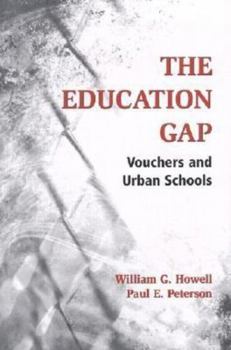The Education Gap: Vouchers and Urban Schools
Select Format
Select Condition 
Book Overview
While the merits of vouchers have been the subject of intense public debate in recent years, there has been very little available evidence upon which to gauge their efficacy. The first publicly funded voucher plan involving private schools wasn't established until 1990 in Milwaukee; before then, the only data on school choice came from a small, poorly designed program in California. Voucher programs grew dramatically in the latter half of the 1990s. In 2000, about 60,000 students participated in seventy-one programs, most privately funded. This growth is now providing researchers with the ability to measure the impact of vouchers for the first time in multiple cities. The Education Gap is the first book to gather a significant body of data on vouchers in multiple locations, and it reveals startling new evidence that voucher programs benefit African-American students more than participants from other ethnic groups. To explain this phenomenon, the authors point out that residential selection is the most common form of school choice available in American public education today. Since this process is likely to leave African Americans in the worst public schools, new forms of choice directed toward low-income families are most likely to benefit black students. The authors examine the effects of school vouchers on test scores, parental satisfaction, parent-school communications, and political tolerance among students and parents participating in four pilot programs in New York City; Dayton, Ohio; Washington, D.C.; the Edgewood school district in San Antonio; and a program that offered vouchers to 40,000 low-income families nationwide. Though the programs operated in a wide variety of settings, the findings were surprisingly consistent. After two years, African-American students who used vouchers to switch from public to private schools scored substantially better on math and reading tests. By contrast, no significant positive effects on the test scores of ot
Format:Hardcover
Language:English
ISBN:0815702140
ISBN13:9780815702146
Release Date:April 2002
Publisher:Brookings Institution Press
Length:288 Pages
Weight:1.36 lbs.
Dimensions:1.1" x 6.4" x 9.3"
Customer Reviews
1 rating
Howell and Peterson are tops in their field
Published by Thriftbooks.com User , 21 years ago
Paul Peterson and William Howell are revolutionaries in their field--Education Public Policy. This book is so great because it lacks the ideological and political biases that permeate nearly 90 percent of the voucher books out there. Despite what the previous reviewer stated I wish to defend Howell and Peterson's book (which needs no defending from me). Their book which is put out by the Brookings Institute (hardly an ideologically driven think-tank Brookings is the model of centrism) Howell and Peterson formulate their empirical data from randomized field trials. RFTs are the gold standard in empirical research studies that seek to compare two groups of individuals while controlling for one factor. In this case Howell and Peterson are able to control for the much noted self-selection bias problematic to many voucher studies and show that African-American students from similar economic and educational backgrounds score significantly (1 standard deviation)higher when they are educated in parochial/private schools than in their neighborhood public schools. A wealth of research from 99.9 percent of all the other scholars studying this topic have in one shape or form supported that finding--that black students do improve upon going to a private school viz. a voucher. Only Alan Krueger and Zho (2004) of Princeton discredit parts of the study, but they refuse to control for baseline data which does not allow them to control the self-selection bias. Furthermore Krueger et al. uses a questionable racial classification scheme where self-identified black/hispanic folks are reclassified as African-American/non-hispanic. In the final analysis its hard to disagree with Peterson and Howell and the above reviewer does so at his own peril. These folks are professionals in the truest sense of the word and they work at the venerable Harvard Program on Education and Governance Policy--please don't try to mislead people into thinking they are overly ideologically motivated.





